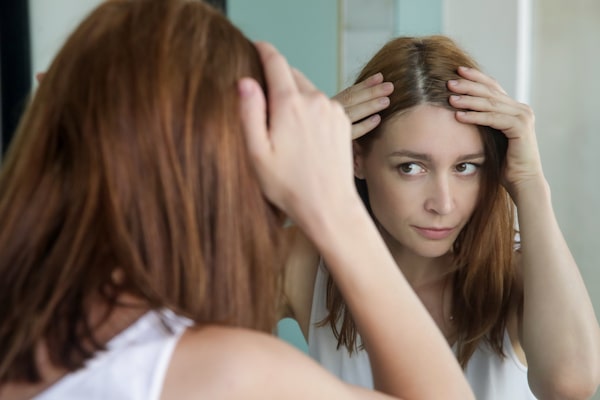
It’s estimated that close to 50 per cent of women and men are affected by hair loss (alopecia) by age 50.nedza/iStockPhoto / Getty Images
Q: I’m 40 and my hair is starting to thin. Are there certain vitamins that can prevent this? What about biotin?
Browse the supplement aisle and you’ll notice there’s no shortage of nutrition supplements claiming to regrow hair and make it thicker and shinier. If you’re starting to lose hair, these claims may sound enticing.
It’s true that your hair follicles rely on a steady uptake of amino acids, fatty acids, vitamins and minerals to support healthy growth. But unless you have a nutrient deficiency, there’s scant evidence that such supplements can make a difference.
Causes of hair loss
It’s estimated that close to 50 per cent of women and men are affected by hair loss (alopecia) by age 50.
The most common type is called androgenetic alopecia – female- or male-pattern hair loss. Hormones called androgens shorten the hair’s growing phase and shrink hair follicles, leading to shorter, finer hair.
Other causes of hair loss include aging, stress, certain medications, thyroid dysfunction and hair hygiene (such as excessive shampooing, heat styling and relaxing treatments).
Diet also factors in. Since approximately 90 per cent of your hair follicles are in a growth stage at any given time, a nutritious diet is critical to produce healthy hair.
Low-calorie or fad diets that provide insufficient protein, iron or zinc, for example, can lead to hair loss. So can rapid weight loss, as well as oversupplementing with certain nutrients, including vitamin A, vitamin E and selenium.
Do hair supplements work?
Online and over-the-counter hair supplements vary in formulation. Some contain only one nutrient (for example, biotin), while others have a combination of ingredients that target multiple benefits (such as hair growth, strength, thickness or shine).
Common ingredients include vitamin B6, biotin, vitamin C, zinc, antioxidants, silica, collagen, fish oil and various plant extracts.
According to a review paper published in 2017 in the journal Dermatology Practical and Conceptual, there’s “a notable lack of evidence” supporting the use of hair loss supplements.
Much of what we know about nutrition and hair growth comes from studies conducted in people with an underlying nutrient deficiency. There’s a lack of research looking at supplementation in people who aren’t nutrient deficient.
And unless you have a nutrient deficiency, there’s only so much supplements can do in regards to hair thickness, since this is largely genetic.
A few companies state that their products are “clinically proven.” But these studies are small and some don’t include a control group for comparison.
Many hair supplement manufacturers provide testimonials touting the benefits of their products. But testimonials are subjective and aren’t based on scientific evidence. (That doesn’t necessarily mean, though, that they should be discounted.)
When it comes to biotin, a 2017 review of studies concluded that the vitamin may benefit hair growth in people with biotin deficiency and uncombable hair syndrome, both of which are rare. No clinical studies have shown that biotin supplements treat hair loss in healthy people who aren’t deficient in the vitamin.
As a side note, biotin can interfere with the lab test thyroid stimulating hormone (TSH). Avoid taking biotin (five milligrams or more) 72 hours prior to thyroid testing.
Eat a nutrient-dense diet
If you’re experiencing unexplained hair loss consult your doctor or dermatologist to determine the cause. Blood tests can uncover if a nutrient deficiency, such as iron or zinc, is the culprit.
A healthy and varied diet can prevent most nutrient-related causes.
Include protein-rich foods (fish, chicken, lean meat, eggs, beans, lentils, tofu, nuts, seeds, yogurt) at each meal to provide follicles with needed amino acids, biotin, vitamin E, iron, zinc and selenium.
Eat plenty of vegetables and fruits each day to supply antioxidant nutrients (for example vitamin C and beta-carotene) and phytochemicals that neutralize free radicals, molecules that can damage follicles and block growth.
Choose healthy fats such as ground flax, chia seeds, hemp seeds, walnuts, avocado and unsaturated cooking oils. Essential fatty acids in these foods are thought to curb the action androgens have on hair follicles and enhance hair follicle growth.
If you eat a healthy diet and want to try a hair supplement, take it for three months to see whether it makes a difference.
Leslie Beck, a Toronto-based private practice dietitian, is director of food and nutrition at Medcan. Follow her on Twitter @LeslieBeckRD
Sign up for the weekly Health & Wellness newsletter for the latest news and advice.
 Leslie Beck
Leslie Beck